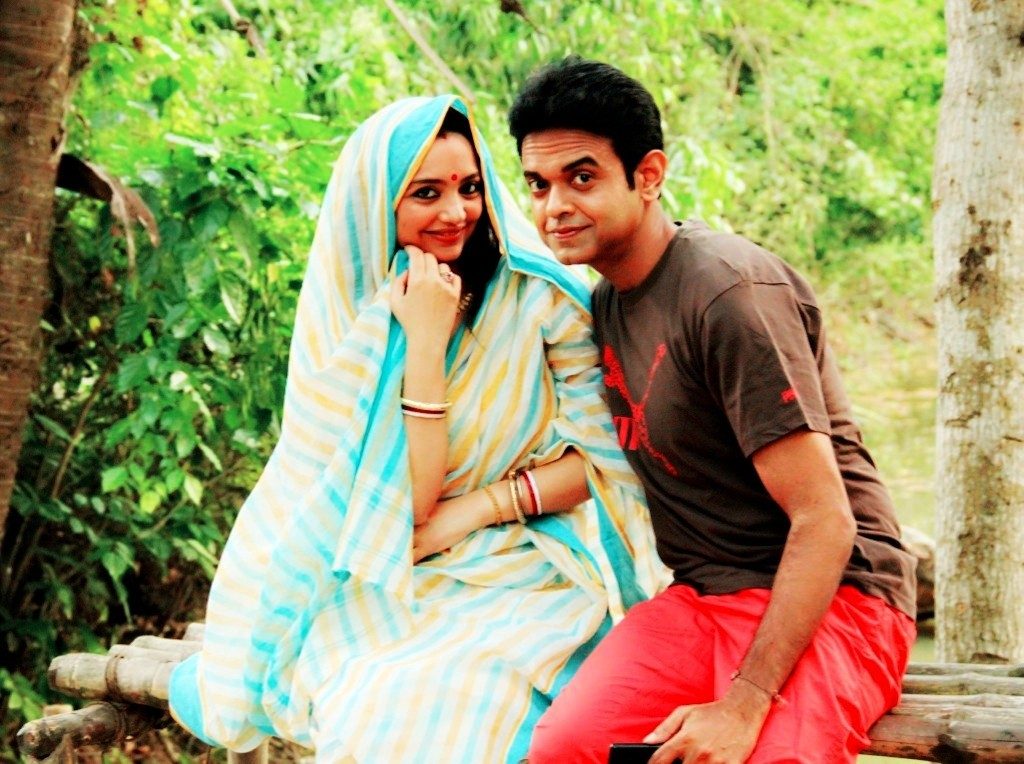It needs great guts to make a directorial debut with what claims to be a ‘sequel’ to Tapan Sinha’s classic box office hit, Banchharamer Bagan (1980). The earlier film, a wonderful social satire disguised as comedy, was based on a hit play written by playwright-actor-director Manoj Mitra, who also played the title role of Banchharam. The screenplay was by Sinha himself and the film remains his biggest commercial hit among his versatile oeuvre.
36 years later, debutant director Amitabha Pathak picks up the idea of placing Banchharam (Pradip Bhattacharya), now 110 years old, in an ambience where the real estate mafia, promoter syndicates and builders begin to chase the old man when a proposed highway is announced next to his huge garden. This forms the foundation of the sequel Banchha Elo Phire. The setting is a remote village called Debipur where Banchha lives with his evil grandson, Guneshwar (Shantilal Mukherjee), and Guneswhar’s wife (Pallavi Chatterjee), who is very fond of Banchharam. She takes very good care of him and her two children, a son and a daughter, neither of who is interested in the garden. Khendi (June Malia), Banchha’s wife, who drowned in the local pond when she was very young, visits her husband as a ghost.
Banchha’s desperate craving to save his beloved garden from greedy promoters like Jhunjhunwala (Rajatava Dutta) and from the alcoholic Guneshwar from trying to sell it off is a good idea for a sequel, if it had continued along the same lines. But suddenly, the film takes a turn by borrowing heavily from the ghost-ridden tracks of Anik Dutta’s bumper hit Bhooter Bhabisyat. What’s more, even part of the music track in the ghost scenes are a direct lift from the theme music of Satyajit Ray’s Monihara, the second story in his Teen Kanya.
In spite of some very good comic sequences marked by the entry of Jhunjhunwalas’s front man (Bobby Chakraborty), who is also the lecherous cellular boyfriend of Punti (Mousumi Bhattacharya) and someone she hasn’t seen, Banchha Elo Phire begins to collapse steadily from a promising beginning to a terrible disaster. Making things worse, in order to raise the entertainment and box office value of the film, the director has needlessly introduced features like a very badly choreographed and performed item number and filled the dialogue not only with generous profanities but also with double entendre, both of which are superfluous and have damaged the film beyond repair.
The biggest tragedy of Banchha Elo Phire is that it has one of the most powerful ensemble of actors, veteran and middle-path and relatively new. Yet their efforts to pull the film out of a bottomless pit fail because of wrong handling and loud performances. Every actor – the list looks like a Who’s Who of Bengali cinema – beginning with Pradip Bhattacharya to Dipankar De, Madhabi Mukherjee, Biplab Bandopadhyay, Shantilal Mukherjee, Pallavi Chatterjee, Rajatava Dutta, June Malia, Supriyo Samaddar, Paran Bandopadhyay, Mousumi Bhattacharya to Bobby Chakraborty could have made this film another new classic presented in a contemporary setting.. This did not happen because the new director either does not know his job or was overawed by the stellar names he had to direct in his very first film. Three new actors who have proved their worth are – Bobby, Mousumi and the actor who plays the yoga-fixated brother of Punti and the great-grandson of Banchha. In particular, the wonderful talent of Pradip Bhattacharya is wasted by the wobbly and unsure script. Both Pallavi and June look too glamorous and modern to fit into the rural scenario while Punti, the great-granddaughter, is too dressed up and full of chutzpah to belong to a remote village.
The music is okay and the songs are fine too. But the sound track is much louder than it needed to be while the editing goes all haywire trying to cut from one location to another in a flurry of changing scenarios. Cinematographer Premendu Bikash Chaki has tried his best within limited circumstances as he contrasts the rich greenery of the village scenes with the narrow, brownish and crowded bylanes of Kolkata.
All in all, the film just does not work and sadly, does the original film no good either.
Bengali, Comedy, Drama, Color


